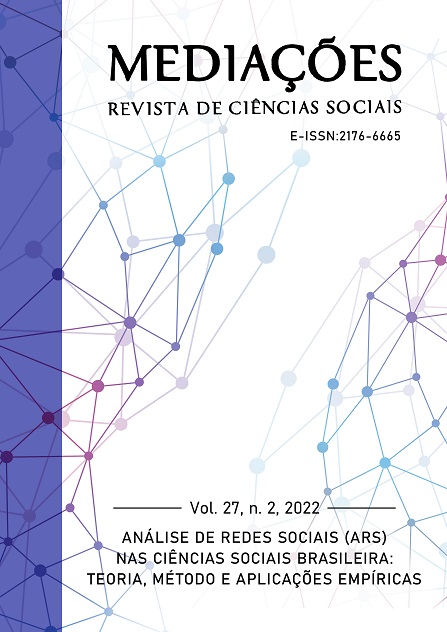Capitalismo de Vigilância em uma Era de Racionalidade Neoliberal
DOI:
https://doi.org/10.5433/2176-6665.2022v27n2e45698Palavras-chave:
vigilância, racionalidade, capitalismo, neoliberalismo, capital humanoResumo
O conceito de Capitalismo de Vigilância revela a lógica de acumulação capitalista das grandes corporações digitais baseada no rastreamento dos usuários da internet, na extração de dados pessoais e na mudança de comportamento. O objetivo deste artigo é questionar o conceito a partir de uma perspectiva que considera a participaçãos dos usuários da internet na própria vigilância. A nova abordagem proposta resulta de uma concepção do neoliberalismo como a racionalidade do capitalismo contemporâneo que exige uma nova ordem subjetiva ancorada na produção de uma sociedade formada por indivíduos-empresa envolvidos ininterruptamente no desenvolvimento de seus capitais humanos para concorrência nas relações sociais em todas as esferas de existência. Assim, a vigilância online conduzida pelas grandes corporações e a expropriação da experiência humana que ela acarreta, é apenas uma parte da história. A outra parte é a eterna busca de desempenho individual nas relações dos indivíduos com os outros e consigo mesmos.
Downloads
Referências
BALL, Kirstie. Exposure: Exploring the Subject of Surveillance. Information, Communication & Society, London, v. 12, n. 5, p. 639-657, 2009. Available at: https://www.tandfonline.com/doi/pdf/10.1080/13691180802270386?needAccess=true. Accessed at: jun. 13, 2022.
BAUMAN, Zygmunt; LYON, David. Liquid surveillance. Cambridge: Polity, 2013.
BROWN, Wendy. In the ruins of neoliberalism: the rise of antidemocratic politics in the west. New York: Columbia University Press, 2019.
BROWN, Wendy. Undoing the demos: neoliberalism's stealth revolution. New York: Zone books, 2015. (Near Futures Series).
DARDOT, Pierre; LAVAL, Christian. Common: on revolution in the 21st century. London: Bloomsbury Academic, 2019.
DARDOT, Pierre; LAVAL, Christian. The new way of the world: on neoliberal society. Translated by Gregory Elliott. London: Verso, 2014.
DELEUZE, Gilles. Negotiations 1972-1990. Translated by Martin Joughin. New York: Columbia University Press, 1997.
D'URBINO, Kuca. Big tech's covid-19 opportunity. The Economist, London, apr. 4, 2020. Available at: https://www.economist.com/leaders/2020/04/04/big-techs-covid-19-opportunity. Accessed at: 13 jun. 2022.
FOUCAULT, Michel. Discipline and punish: the birth of the prison. New York: Pantheon Books, 1977.
FOUCAULT, Michel. History of sexuality. New York: Pantheon Books, 1978. v. 1: an introduction. Available at: https://suplaney.files.wordpress.com/2010/09/foucault-the-history-of-sexuality-volume-1.pdf. Accessed at: jun. 13, 2022.
FOUCAULT, Michel. Security, Territory, population. New York: Picador, 2009. v. 6: Michel Foucault Lectures at the Collège de France 1977-1978.
FOUCAULT, Michel. Society must be defended. New York: Picador, 2003. v. 5: Michel Foucault Lectures at the Collège de France 1977-1978.
FOUCAULT, Michel. The birth of biopolitics. New York: Picador, 2010. v. 7: Michel Foucault Lectures at the Collège de France 1977-1978.
HAGGERTY, Kevin D. Tear down the Walls: on demolishing the panopticon. In: LYON, David (org.). Theorizing Surveillance: the panopticon and beyond. London: Willan Publishing, 2006. p. 23.
HARCOURT, Bernard E. Exposed: desire and disobedience in the digital age. Cambridge: Harvard University Press, 2015.
HARVEY, David. A brief history of neoliberalism. Oxford: Oxford University Press, 2007.
HARVEY, David. The enigma of capital and the crises of capitalism. London: Profile Books, 2011.
KLEIN, Naomi. The shock doctrine: the rise of disaster capitalism. New York: Picador, 2008.
LUXEMBURG, Rosa. The accumulation of capital. Translated by Agnes Schwarzschild. Eastford: Martino Fine Books, 2015.
LYON, David. Surveillance Culture: Engagement, Exposure, and Ethics in Digital Modernity. International Journal of Communication, Los Angeles, v. 11, n. 1, p. 824-842, 2017. Available at: https://ijoc.org/index.php/ijoc/article/viewFile/5527/1933. Accessed at: jun. 13, 2022.
LYON, David. The culture of surveillance: watching as a way of life. Cambridge: Polity Press, 2018.
MANOKHA, Ivan. Surveillance, panopticism, and self-discipline in the Digital Age. Surveillance and Society, Chapel Hill, v. 16, n. 2, p. 219-237, 2018. Available at: https://ojs.library.queensu.ca/index.php/surveillance-and-society/article/view/8346/7674. Accessed at: 13 jun. 2022.
MARWICK, Alice E.; BOYD, Danah. I Tweet Honestly, I Tweet Passionately: twitter users, context collapse and the imagined audience. New Media & Society, Thousand Oaks, v. 13, n. 1, p. 114-133, 2010. Available at: https://journals.sagepub.com/doi/pdf/10.1177/1461444810365313. Accessed at: 13 jun. 2022.
MARX, Karl. Capital: A Critique of Political Economy. Overland Park: Digi Reads, 2017. v 1.
POLANYI, Karl. The Great Transformation: the political and economic origins of our time. Boston: Beacon Press, 2001. Available at: https://inctpped.ie.ufrj.br/spiderweb/pdf_4/Great_Transformation.pdf. Accessed at: 13 jun. 2022.
ZUBOFF, Soshana. Big other: surveillance capitalism and the prospects of an information civilization. Journal of Information Technology, London, v. 30, p. 75-89, 2015. Available at: https://journals.sagepub.com/doi/pdf/10.1057/jit.2015.5. Accessed at: 13 jun. 2022.
ZUBOFF, Soshana. The Age of Surveillance Capitalism: the fight for a human future at the new frontier of power. New York: Public Affairs, 2019.
Downloads
Publicado
Como Citar
Edição
Seção
Licença
Copyright (c) 2022 Iafet Leonardi Bricalli

Este trabalho está licenciado sob uma licença Creative Commons Attribution 4.0 International License.
Os direitos autorais relativos aos artigos publicados em Mediações são do(a)s autore(a)s; solicita-se aos(às) autore(a)s, em caso de republicação parcial ou total da primeira publicação, a indicação da publicação original no periódico.
Mediações utiliza a licença Creative Commons Attribution 4.0 International, que prevê Acesso Aberto, facultando a qualquer usuário(a) a leitura, o download, a cópia e a disseminação de seu conteúdo, desde que adequadamente referenciado.
As opiniões emitidas pelo(a)s autore(a)s dos artigos são de sua exclusiva responsabilidade.





































